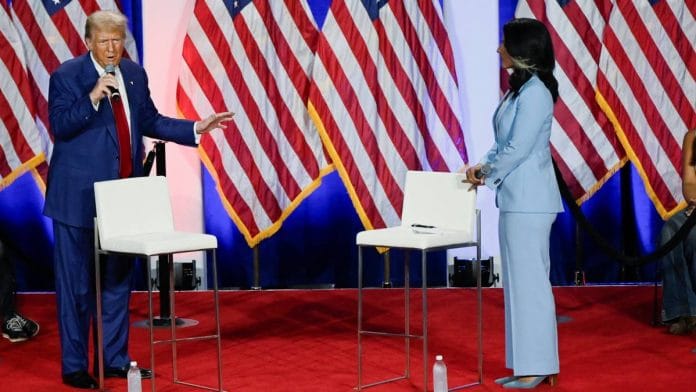New Delhi: Hindu American Tulsi Gabbard, a military veteran and former Democratic Congresswoman who has been nominated as director of national intelligence (DNI) by US President-elect Donald Trump, will oversee 18 intelligence agencies and play a role in shaping the US national security strategy.
However, the significance of her role will be dependent on what Trump wants to do since she is an adviser to the president on intelligence matters, American sources said. This is because Trump also has the national security adviser, who heads the National Security Council and advises the president on national and global security issues. This is a historical position as opposed to the DNI, which is a fairly new post.
The post of DNI was created in the aftermath of 9/11 and its primary objective is to unify intelligence-sharing and improve responses to complex threats, making it one of the most influential roles in the intelligence community.
Trump’s leadership style and policy priorities could have a significant impact on how the DNI operates during his second term. The current DNI is Avril Haines, who was appointed by the Joe Biden administration in January 2021.
Also Read: Elon Musk, Vivek Ramaswamy to lead US Department of Government Efficiency in Trump 2.0 cabinet
What does DNI do?
The role of DNI was established in 2004 by the Intelligence Reform and Terrorism Prevention Act in response to communication and coordination failures highlighted by the 9/11 attacks.
Prior to its creation, US agencies such as the Central Intelligence Agency (CIA), Federal Bureau of Investigation (FBI), National Security Agency and Defense Intelligence Agency operated largely independently, often failing to share critical intelligence. This lack of integration was deemed a significant vulnerability.
The DNI was tasked with addressing these gaps by ensuring that all intelligence agencies work collaboratively and share information effectively.
While the DNI does not collect intelligence directly, he/she plays a key role in managing and integrating the efforts of these agencies, setting priorities, and preventing duplication of efforts.
The DNI is also the US president’s principal intelligence adviser, synthesising and presenting critical insights that influence national security decisions.
The first DNI was appointed in 2005 by then president George W. Bush.
The DNI’s responsibilities encompass a wide range of activities aimed at maintaining the integrity and efficiency of US intelligence operations.
The director oversees the US Intelligence Community that comprises 18 agencies with missions ranging from counterterrorism to cybersecurity. It includes managing the National Intelligence Program, which involves setting budgets, prioritising resources and ensuring strategic alignment across agencies.
To provide comprehensive intelligence briefings to the president and the National Security Council, the DNI synthesises information from multiple agencies and ensures that policymakers receive a holistic view of national security threats.
The DNI also plays a pivotal role in coordinating rapid responses to emerging threats, whether they involve cybersecurity breaches, foreign interference, or acts of terrorism.
Post-9/11 reforms placed significant emphasis on data-sharing and inter-agency communication, roles that remain critical today. For instance, if the FBI uncovers a foreign cyberattack, the DNI facilitates information-sharing with agencies such as the NSA and CIA, enabling a unified and effective response.
Impact of presidential priorities on DNI’s role
The priorities and focus of the DNI often shift with changes in presidential administrations, reflecting the sitting president’s national security strategy.
Under Barack Obama, the DNI focused heavily on combating al-Qaeda, managing intelligence related to military operations overseas and addressing global terrorism. In contrast, Trump’s first term as president saw greater emphasis on countering Chinese and Russian influence, as well as on bolstering cybersecurity defenses.
If Trump’s approach remains consistent, his second term will likely have a DNI who aligns with his “America First” doctrine. This could translate to heightened attention on domestic intelligence capabilities, election security and countering foreign interference in US politics.
Trump’s apparent skepticism of international intelligence alliances could also influence the DNI to focus more on selective collaboration with foreign partners, prioritising internal resources over global initiatives.
Gabbard as DNI & Trump’s priorities
Gabbard, who joined the Republican Party this year, is known for her anti-interventionist views and has often opposed US involvement in conflicts. She has been criticised for her views on Russia, Ukraine, Syria and Iran, and for statements that appear to align with Russian narratives or which seem to downplay threats from certain countries. She also has close ties with India and supports Israel’s stance against Hamas.
Her appointment as DNI has drawn criticism because of her lack of direct intelligence experience and her history of controversial positions. Critics, including some Republicans, argue that her stance on Russia, Syria, and other international issues may be at odds with traditional US intelligence priorities.
Political analysts suggest that her appointment is a reward for her support of Trump. While Gabbard’s influence on US intelligence policy could be limited, her role could align with Trump’s broader policy directions, particularly in terms of a more isolationist stance in foreign affairs.
Trump’s preference for a self-reliant intelligence apparatus suggests a possible reduction in multilateral intelligence collaborations, emphasising domestic capabilities instead. The DNI under him may prioritise counterintelligence efforts aimed at curbing espionage and cyber operations by adversaries like China and Russia.
Election security is likely to remain a significant focus, as Trump has repeatedly raised concerns about foreign interference in US elections. His choice of DNI will likely aim to reinforce this agenda, potentially involving stricter measures to counteract such activities.
(Edited by Nida Fatima Siddiqui)
Also Read: Trump’s blanket desire to avoid all wars can lead to the same wars he wants to avoid






